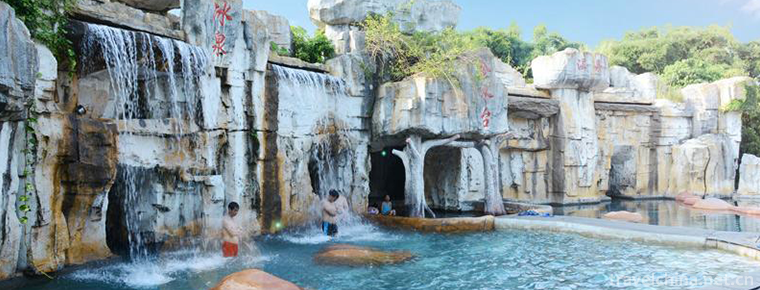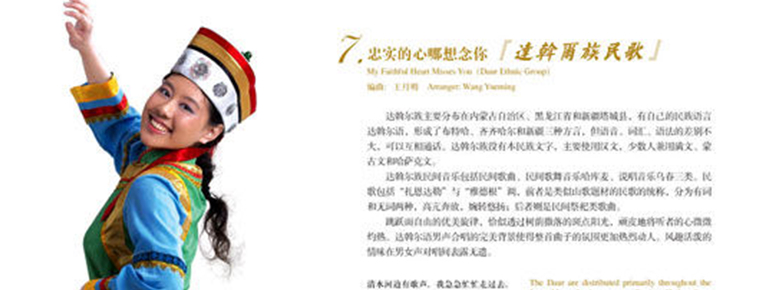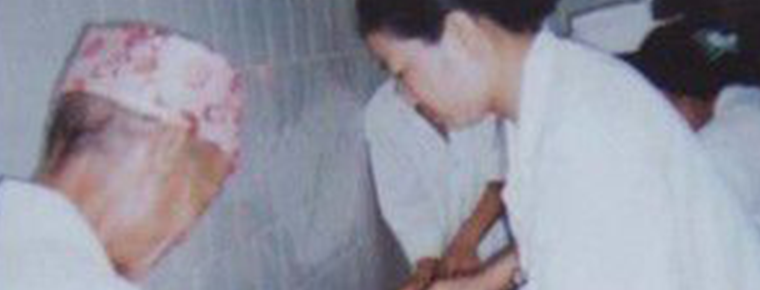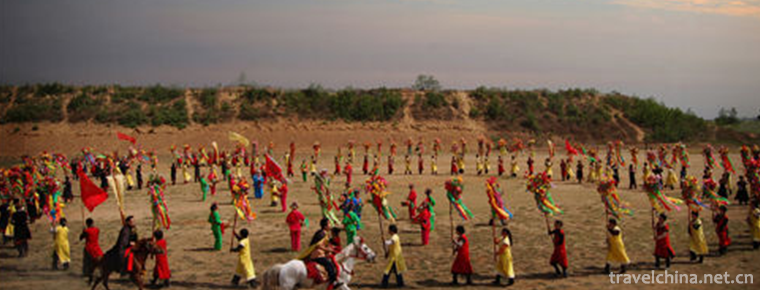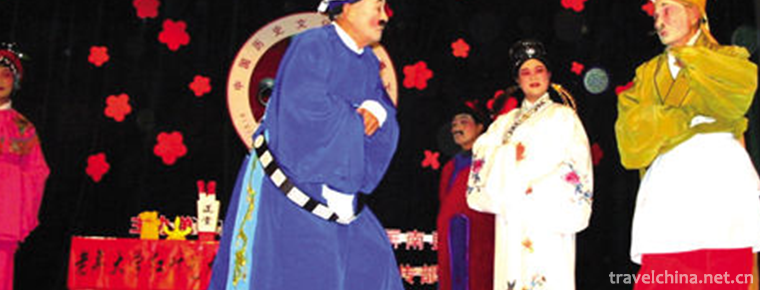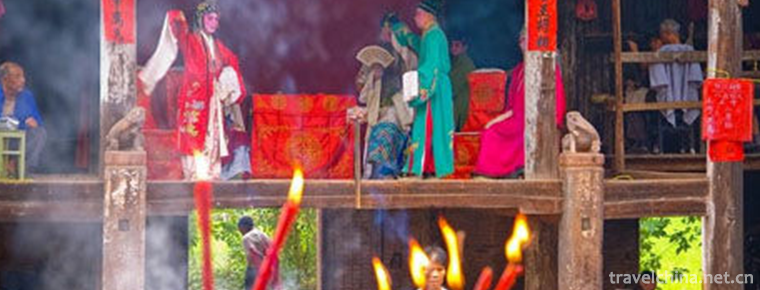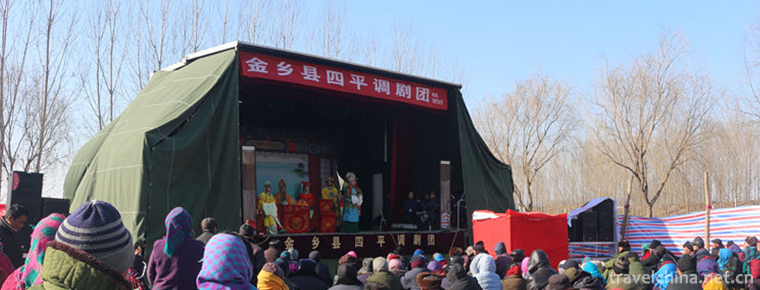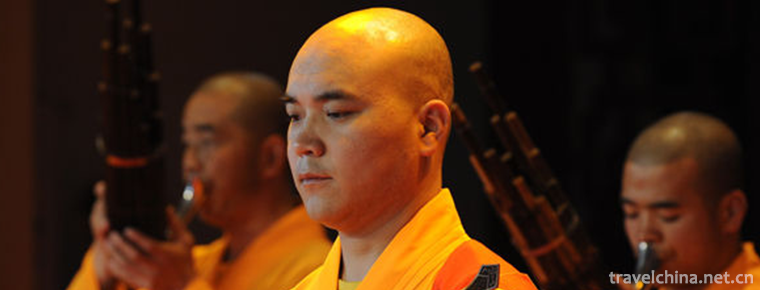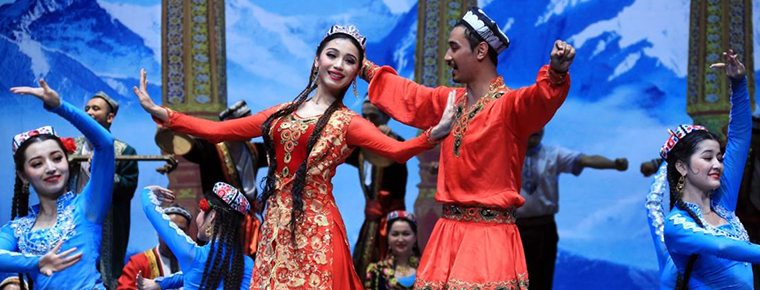Taiji of Yi Nationality
Taiji of Yi Nationality
Yi nationality Qitaiji: Guizhou Province's first batch of national traditional drama intangible cultural heritage list.
Qitaiji is an ancient form of drama that only exists in Nugazhai village, Bandi Township, Weining Yi Hui Miao Autonomous County, Guizhou Province. Taiji is the transliteration of Yi, the word "Qi" means ghost, the word "Tai" means change, and the word "Ji" means game, which is translated into "changing play" or "when human beings just become" and "the drama of human changes". When did it originate? Up to now, there is no definite conclusion, and there is no record in Yi classics.
Typical performances are performed on the third to fifteenth day of the first lunar month, aiming at exorcising evil spirits, welcoming good luck and praying for good harvest. The performances are mostly performed at night. The performance form is very unique. The performers wrap their heads in sharp cones with white headkerchiefs, and their bodies and limbs are tightly wrapped with cloth to symbolize nudity. Some people wear masks on their heads. The masks are mainly composed of five sides: the Yi elderly (1700 years old), the old woman (1500 years old), the Miao elderly (1200 years old), the Han elderly (1000 years old) and the children. The mask is about a foot long. It has a prominent forehead, a straight nose, holes in eyes and mouth. It is painted black with pot smoke. Lime and chalk are used to draw various lines on the forehead and face. It is black and white. It is very rough, mysterious, primitive and stery. The maskless person is an old man or a mountain god (2000 years old), incarnating nature and wisdom.
In 2006, the State Council approved the Yi nationality Qitaiji to be included in the first batch of national intangible cultural heritage list.
Tracing to the source
As for the age of "Qitaiji", it is difficult to check because of the lack of historical data. From the content analysis of the drama, it may be conceived in the Han Dynasty, after constant revision and supplement, it was not finalized until the middle of the Qing Dynasty.
"Qitaiji" is now only circulated in Nujia Village, Bandi Township, Weining Yi Hui and Miao Autonomous County, Guizhou Province. The village is located in Luhong Mountain area, which is more than 2,800 meters above sea level. The mountain is dense, the climate is cold, the frost period is long, the main crops are corn, potato, buckwheat, etc. The yield is very low, and the local people's life is very bitter. Sixty-one households in the village live in low grass houses without a tile house. Because of the backward medical, health, science and culture, remote location and inconvenient transportation, local villagers are used to sacrifice mountain gods, beat powder fire, roll eggs, and chant ghosts when they encounter natural and man-made disasters, in order to dispel the epidemic and pray for peace. In Nujiacun, Yi, Miao and Han live together. Among the 61 families with 13 surnames, Wen and Tuesday surnames are big surnames, with 12 families each. Wen Daohua is the main actor of "Qi Taiji". The Yi people, from their father to five generations, are Bimo. They all host and participate in the performance of "Qi Taiji".
For thousands of years, "Qitaiji" grew up unknown in the deep mountains and wild forests of Western Guizhou. It was seldom influenced by the Han culture, but retained a strong primitive artistic quality. Such an ancient drama has been extremely rare in China, so once discovered, its great academic and artistic value has attracted widespread attention. Every year, a large number of domestic and foreign scholars visit and study .
artistic characteristics
"Qitaiji" is usually performed on the third to fifteenth day of the first month of the lunar calendar, aiming at exorcising evil spirits, welcoming good luck and praying for good harvest. The performances were mostly performed at night, in a flat area in the mountains beside the village. In case of natural and man-made disasters, the annual growth is not good, it is held every few years.
The mask is made of Alpine hard miscellaneous wood such as Rhododendron and lacquer tree. The process is very simple. First, the round wood about one foot long is cut into wool embryos with an axe, and then the five senses are roughly carved out. Faces are male, female, old and young, but there is no need to distinguish gender and age. Single color, no need to paint meticulously, just use ink or pot smoke to paint salty black casually, before the performance with lime or chalk on the face and forehead to draw a white line. The main features of its shape are that the forehead is particularly bulging, the nose is thick and slender, and the nose bridge is high; the outer corner of the eyes is raised, showing an inverse octagonal shape, without lips, teeth and ears, giving a simple, primitive, weird, ghostless, innocent, delicate, fat-free pink, strong and strong atmosphere. The actors wore conical, high-footed headdresses. Its general style can be summarized in eight words: simple, naive, grotesque and exaggerated.
Usually from 10 to 17 performers, the main division of labor is three people acting as lions, two people acting as cattle, two people playing gongs and drums, four people holding lanterns, torches, six people acting as roles, the name of the role is as follows:
Jangar Abu, an old man or God of mountains, is 2000 years old. He is the incarnation of natural gods and wisdom. He does not wear masks and speaks in a normal human voice. Blue cloth Baotou, with corn cob inserted in the head to express golden horn, meaning ancient, wearing string or wheat straw to make false beard, symbolizing longevity, face wearing two eggshells made of glasses, symbolizing the perspective of chaos and haze, to see the changes and development of things. Most of the actors are hereditary and can not be changed.
Abu Mou, meaning Grandpa, 1700 years old, wears a white-bearded mask, which is the widest and heaviest. Painting horizontal wave white decoration, with black scarf wrapped head in a conical shape, symbolizing the old, Adam's spouse.
Adam, meaning wife, grandmother, 1500 years old, wearing no mask, the mask is as large as a disc face, the top of the spiral white line, face parts painted with oblique wave white decoration, the first time on the stage back baby Ann (replaced by props).
Mahongma, an elderly Miao, male, 1200 years old, wears a black-bearded mask and paints straight wavy white decorations.
Ann, meaning a baby, is the son of Abu Mohamed Adam, wearing no mask, only entered the second half.
The above actors are all legged with white cloth bands, shoulder-to-shoulder with white cloth bands crossed at the waist, wearing blue or black clothes, which symbolizes that the early human being was naked. It is said that Ah'an did not appear in the original play. He was only replaced by a cloth bag during the performance. Later, Ah'an joined in the performance of "Qi Taiji", because "after acting for so many years, he should grow up".
The performances were performed in a dark, mysterious, deep and thrilling atmosphere at night, with torches and lanterns shining brightly and reflecting each other. The masked actors were magnificent and magnificent, simulating the working life of their predecessors. Witnessing this scene makes people feel in the old man's living situation, spiritual excitement, inner excitement, as if the ancestors are around, what ghosts and evil, disaster will hide far away, dare not come again, the next year will be smooth weather, bumper grain.
The performance of Qitaiji is mainly divided into four parts: sacrifice, cultivation, celebration and village sweeping. The cultivation is the core of the whole play, which mainly reflects the history of Yi migration, farming and reproduction. The fourth part is only performed on the fifteenth day of the first lunar month.
Part I: Sacrifice. Abu Mu led Adam, Mahonmo and Hebu out of the forest with sticks. They wrapped their heads in sharp cones, wore black clothes and pants all over, wrapped their chest, back, waist and legs tightly with white cloth strips to symbolize nudity; staggered around in a band to show that ancient humans could not stand upright; on the one hand, hit the vocal cords and made ape-like calls. When he came to the open land, the old man put down his stick and prayed to heaven, earth, ancestors and the four gods in the face of the West (legendary Yi immigrated from the West to Weining).
Part II: Farming. This is the core part of the play, which mainly reflects the history of migration, farming and reproduction of Yi ancestors. In the first half, through the dialogue between Abu and Abu Mu, the author narrates the successive years of famine in the ancient Naked Cancer Village. Abu Mu, carrying grain seeds, started from ditches (in Yunnan Province), went through many places along the way, and finally came to Naked Cancer Village to teach the local people to open up wasteland to spend the year of disaster.
Afterwards, Abu Mo and others used dancing movements to reproduce the working process of Yi ancestors in farming production, such as buying cattle, ploughing, raking, sowing, harvesting and threshing. Intermittent labor, interspersed with smoking, mating, feeding and other movements. In the second half, the writer describes that the grain harvest is good, and the old man Qitai fills the warehouses with wine and prays to heaven and earth, gods and grain.
Part three: Joy. Lion dancers tease lions with sticks and dance on the ground to congratulate on the harvest of grain. According to the local Yi people, this part of the content did not exist before, but it was only joined in modern times.
Part IV: Sweeping villages. That is to sweep Mars. The Yi language is called "Midaoqiu". At the end of the performance on the 15th day of the first lunar month, Jangar Abu led the "Qitai" elderly people to go to villages and villages to wipe out disasters and plagues, wishing people and livestock prosperity and a bumper harvest. Every time we get to a house, we have to read a lucky message by the fire pond and ask the owner for eggs and hemp. When we leave, we pull a piece of grass from the corners of the grass house. Then he came to Zhaibian intersection, buried three eggs in the soil, lit the grass, cooked the rest of the eggs and ate them, and cried out in his mouth, "Mars is gone! Mars is gone! "Every other day, the old man of Qitai takes the buried eggs and judges the harvest and the good or bad of the year .
Taj masks
"Qitaiji" is an ancient drama, whose mask is permeated with a primitive accumulation; the forehead protrudes, the nose is straight, with obvious apes outlining the ancestors'imprint. There are no eyes and teeth, only holes in the corresponding parts to show the eyes and mouth; no holes in the eyes, it seems to be able to penetrate thousands of years, people and gods, life and death become blurred. Simple, naive, naive and grotesque are the overall style of the "Pin Taj" mask. Mask sculpture does not discriminate between men and women. It distinguishes the sex of the characters from the old and the young by wearing a beard and drawing lines in different shapes with chalk. Abu Moh, meaning "Grandpa", is said to be a wise old man aged 1700. Acting as the leader and organizer of national migration and productive labor in the play is highly respected. The mask has an elegant white beard, and then uses chalk to draw horizontal wave lines as a mark of longevity and wisdom. The white line decoration of each mask is different, either horizontal or vertical, thick or thin, some are radial, some are wavy. The picture is Mahongma, meaning "Miao old man". Legend has it that he is 1200 years old. His face wrinkles are oblique and vertical, and his beard is black.
Inheritance value
"Qitaiji" is the crystallization of Yi ancestors'artistic creation in their long-term production and life practice. In the era of undeveloped traffic culture, they want to express their joys and sorrows and pass on them. The best way is to use songs, dances and plays, that is, to pass on their hearts orally or to teach them music. "Qitaiji" is just this kind of ancient Yi opera which originates from life and is higher than the original flavor of life. Whether it reflects the connotation or the form of its performance, it is the unique creation of the Yi people, and it is not influenced by other ethnic cultures. Therefore, "Qitaiji" has been praised as the "living fossil of Yi drama" by experts and scholars at home and abroad. No matter in anthropology, ethnology, folklore, drama, dance and so on, it has very high academic research value .
Qitaiji has been spread in a remote area and has been less affected by the outside world. However, under the impact of modern civilization, this art, which is only grasped and inherited by a few people, appears very fragile. Any link that has problems will cause it to suffer a fatal blow. Therefore, it is necessary to do a good job of relevant protection. Work. Luo Xiaoyun and Wendaohua of Weining Yi Hui and Miao Autonomous County were awarded the second batch of national intangible cultural heritage projects as representative successors.
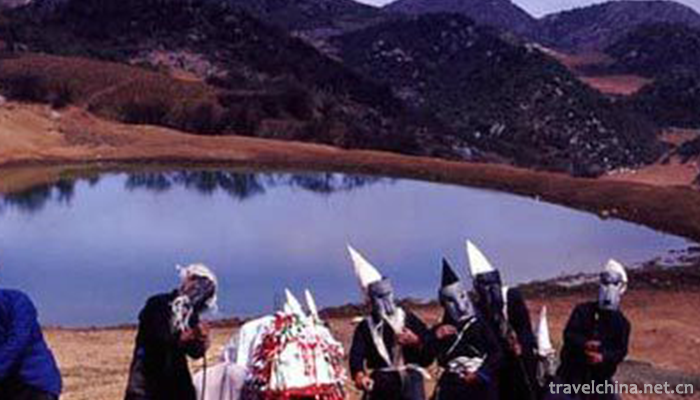
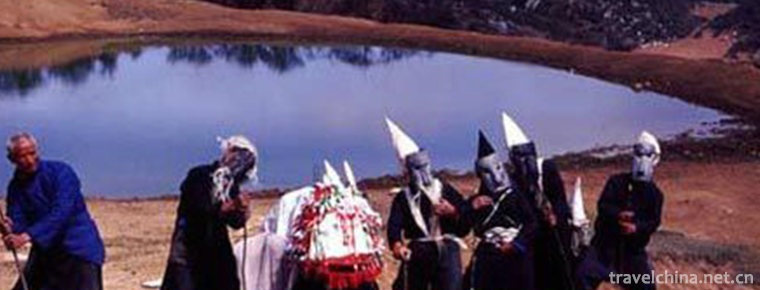
Taiji of Yi Nationality
-
Jinshuitai Hot Spring Scenic Area
Jinshuitai Hot Spring is a hot spring resort built according to the national AAAA scenic standard. It is located in Shuitai Town, Xinxing County, Guangdong Province
Views: 401 Time 2019-01-27 -
Yinghu Scenic Area
Yinghu, a national AAAA-level tourist area, is located 16 kilometers southwest of Ankang City, Shaanxi Province. The total area is 102.8 square kilometers, including 77 square kilometers
Views: 187 Time 2019-03-05 -
Daur Folk Songs
Daur people mainly live in Inner Mongolia Autonomous Region and Heilongjiang Province, and a few live in Tacheng County, Xinjiang. Daur means "pioneer".
Views: 319 Time 2019-04-22 -
Dai Medicine Sleeping Drug Therapy
Sleeping pill therapy, one of the ten traditional Dai medicine therapies, is the third batch of national cultural heritage in Yunnan.
Views: 180 Time 2019-04-24 -
Running curtain
Running curtain originated in the Spring and Autumn Period and Warring States Period, formed in the Qin and Han Dynasties, flourished in the Song, Yuan, Ming, Qing Dynasty and the early Republic of Ch
Views: 349 Time 2019-06-09 -
Ping Tan drama
Pingjiao Opera is a kind of high-pitched opera that sings opera and prose in local dialect. It is a unique local opera in Fujian Province. It was formed in the early Qing Dynasty, originated in Pingna
Views: 136 Time 2019-06-09 -
Qiyang Opera
Qi Opera is one of the traditional local dramas in Hunan Province. It is also called Qiyang Band, Qiyang Opera in the early years of the Republic of China, and Qiyang Qidong Opera in the folk
Views: 111 Time 2019-06-10 -
Siping Tune
The Siping tune evolved from the flower drum in eastern Henan. After digging and sorting out, it absorbed the tunes of opera critics, Peking Opera, Henan Opera and so on. It gradually perfected and fo
Views: 142 Time 2019-06-16 -
Wutaishan Buddhist Music
Wutai Mountain Buddhist music refers to the traditional Buddhist music that has been circulating for a long time in the temples of Wutai Mountain, the top four famous mountains of Chinese Buddhism. Wu
Views: 136 Time 2019-06-29 -
Machirev
Machirev is a name for a form of dance and entertainment, which refers to a large-scale self-entertainment activity with a large number of participants (the so-called participation refers to those who
Views: 122 Time 2019-07-06 -
Huahu Lake
Huahu is located on the 213 national road between Ruoergai in Sichuan Province and Langmu temple in Gansu Province. It is a natural Haizi on the grassland of GER dam. Geer dam is the second largest grassland in China after Hulunbeir Grassland
Views: 169 Time 2020-11-07 -
Location of Meishan
Meishan is located in the southwest of Chengdu Plain and the middle reaches of Minjiang River in Sichuan Basin. It spans 29 ° 24 ′ - 30 ° 16 ′ N and 102 ° 49 ′ - 104 ° 30 ′ e. it is 150 km long from east to west and 72 km wide from south to north. It connects Chengdu,
Views: 380 Time 2020-12-18
